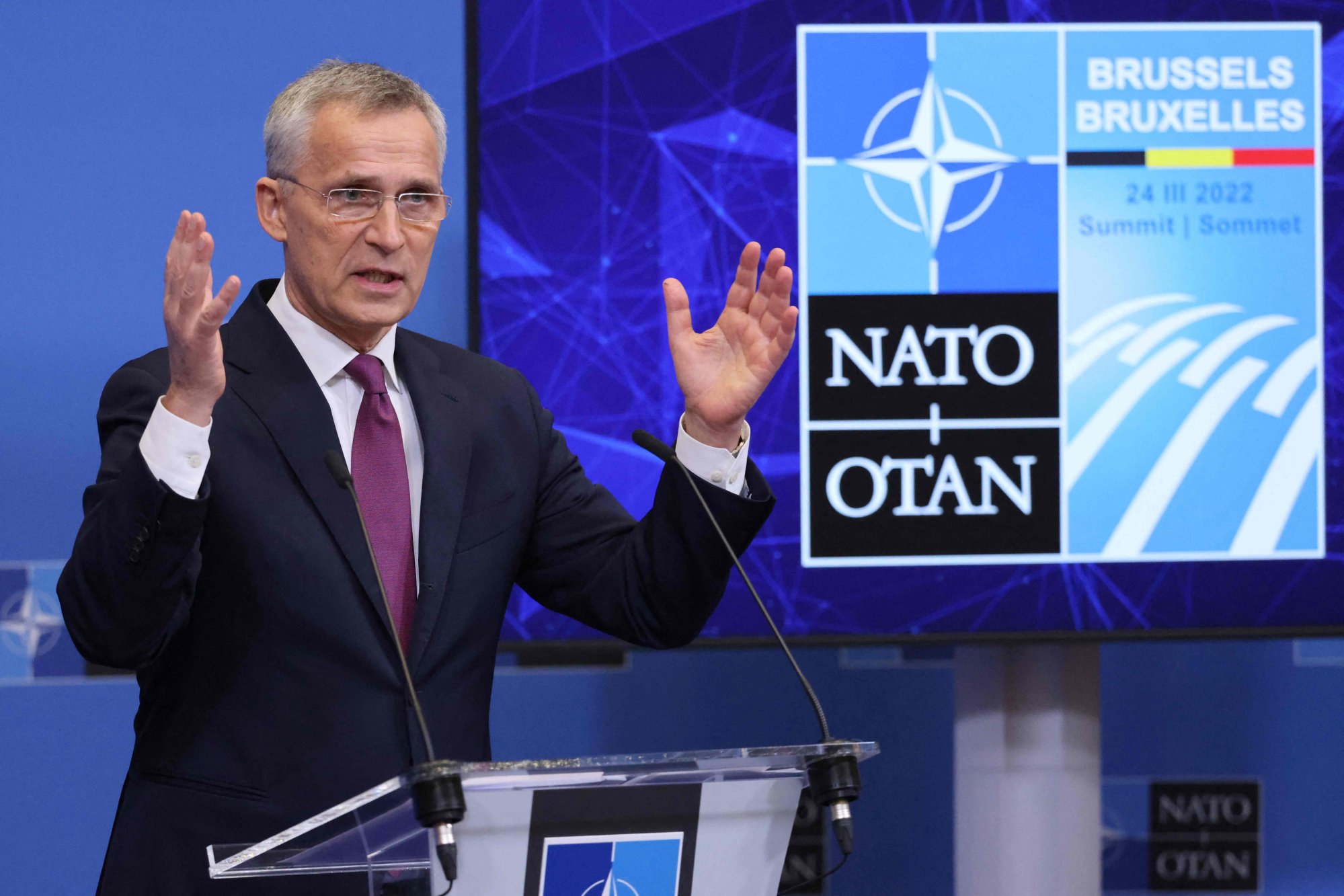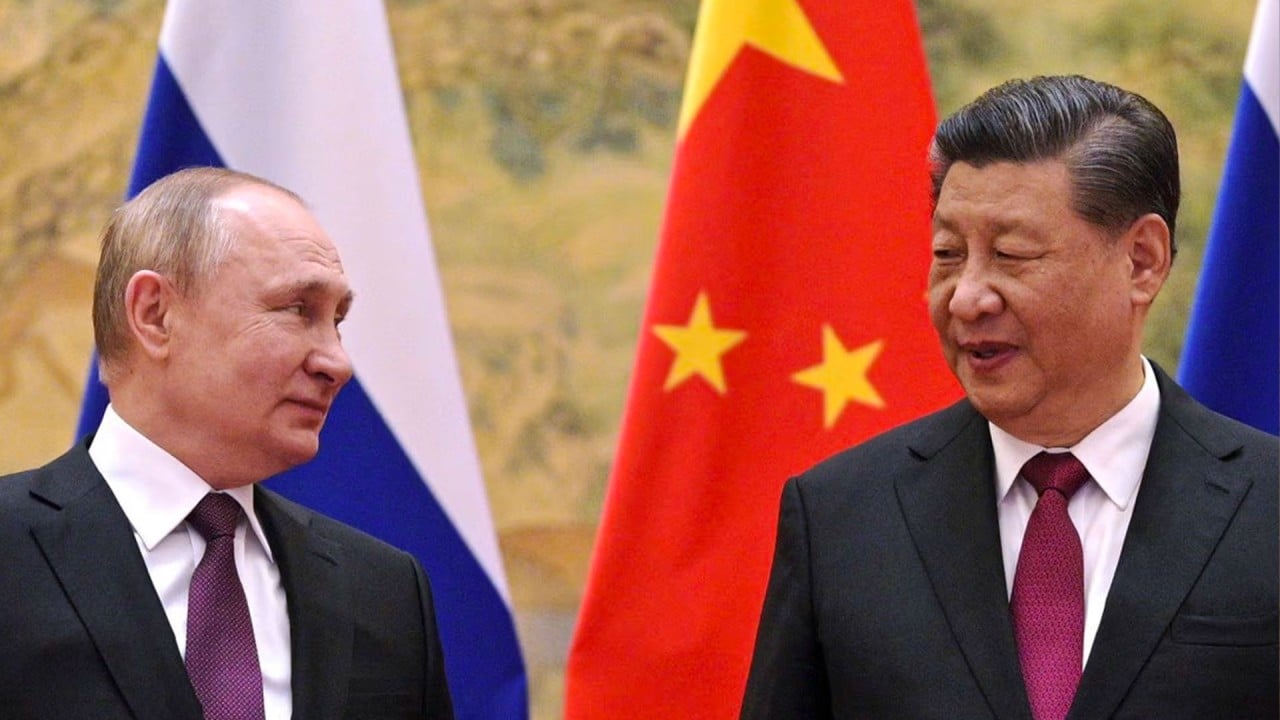
Ukraine war: Chinese help for Russia is key topic as Joe Biden arrives in Europe to meet with allies
- The EU wants to send a message to Beijing that propping up Vladimir Putin is unacceptable, says a senior European diplomat
- The US president will attend meetings of the European Council, Nato and the G7 before travelling to Poland
The leaders of the United States and European Union will discuss China’s perceived support for Russia’s war against Ukraine at a flurry of major summits on Thursday, after US President Joe Biden arrived in Brussels on Wednesday evening.
Biden will attend meetings of the European Council, Nato and the Group of 7 nations on Thursday and fly to Poland on Friday, during which China’s positioning on the Russian invasion will be a prime topic. He will ensure that allies are under no illusions about Beijing before next week’s crucial EU-China summit.
Senior EU officials expect Biden to relay a message about China’s potential assistance to Moscow in circumventing crippling sanctions and providing military equipment, “whether it’s intentional or not”, amid speculation that Beijing was ready to offer an economic lifeline.
Biden will “certainly consult on the question of China’s potential participation in the conflict of Ukraine while he’s in Brussels”, his national security adviser, Jake Sullivan, said on Tuesday. “We believe we’re very much on the same page with our European partners and we will be speaking with one voice on this issue.”
While the tone and tenor of the conversation on China may vary between the EU and US – and indeed between EU member states – Biden will find Europeans more receptive to his critique of Beijing than last May, during his first transatlantic trip as president.
One senior diplomat, speaking on condition of anonymity, said the EU wanted to send a sharp message to Beijing that propping up Vladimir Putin was unacceptable. The EU is willing to take a huge economic hit by sanctioning Russia, the diplomat said, a fact that should resonate in the corridors of Zhongnanhai.
“We spent a long time looking for a resilient EU, and now we are a big player, thanks to Putin. Putin helped us find our place, and China has to recognise now that they weren’t expecting us to be so united. For them, the reality has changed,” the diplomat said.
A second senior diplomat said there would be “consequences for our relationship if China doesn’t join the emerging consensus of the world community”.
A year after sanctions, EU-China ties face new ‘defining moment’ on Russia
At Nato, meanwhile, there will be debate over Beijing’s refusal to condemn Russia, with the alliance’s leadership viewing it as tacit support for Putin.
“What we have seen is that China has not been able to condemn the invasion,” Nato Secretary General Jens Stoltenberg said on Wednesday. “We’re also seeing that Chinese state authorities have [repeated] some of the same lies about Ukraine and about Nato, and in that way provided political support to to Russia.”
Stoltenberg said leaders would push for China to condemn Russia, amid concern that Beijing’s joint statement with Moscow on February 4, when the nations declared a “no limits” partnership, signalled a new threat to European security.
“China now for the first time has questioned some of the key principles of our security, including the right for every nation unit to choose his own path,” Stoltenberg said. “China joins Russia in trying to deny European nations the freedom to choose their own paths.”

On the surface though, the EU continues to prioritise maintaining close communication with Beijing, in hopes that it can exert some influence on Russia and help end the war.
Speaking in the European Parliament on Tuesday, the bloc’s trade chief, Valdis Dombrovskis, said he did not want to see “new polarisation” or push China and Russia into “a new alliance”.
At a meeting of the bloc’s foreign ministers on Monday, a number of member states spoke in favour of continuing the diplomatic outreach, according to someone familiar with the talks.
But suspicions that Beijing is helping Moscow are rife, and there is debate across Europe on how best to calibrate a response.
At a private meeting of the national leaders and lawmakers affiliated with the centre-right European People’s Party – the largest group in the European Parliament – in Brussels on Wednesday, one senior figure said that if China was to offer such backing, it “will automatically become an enemy”, sources familiar with the discussions said.
Ukraine war: EU encourages China to back new sanctions on Russia
“All over Europe, it’s very similar in what you’re hearing: this is a game changer already. And then the question of arms deliveries would be the ultimate game changer,” said Janka Oertel, director of the Asia programme at the European Council on Foreign Relations.
The differences between member states are “more a question of style and tone than in substance”, Oertel said.
This was reflected in an exchange at an EU ambassadors meeting on Friday, during which Germany urged caution on the tone in which the bloc engages China lest it push it closer to Russia. German envoys were adamant, however, that Beijing must be made aware that we are at “a defining moment” in EU-China relations for decades to come.
“I think one of the biggest lessons to draw from the war in Ukraine is how quickly Europe has mobilised to sanction Russia and throw their support behind Ukraine in concert with the US,” said Scott Kennedy, a China specialist at the Centre for Strategic and International Studies, a think tank in Washington.
“This has revitalised transatlantic relations along numerous fronts.”
Additional reporting by Robert Delaney and Joshua Cartwright in Washington


